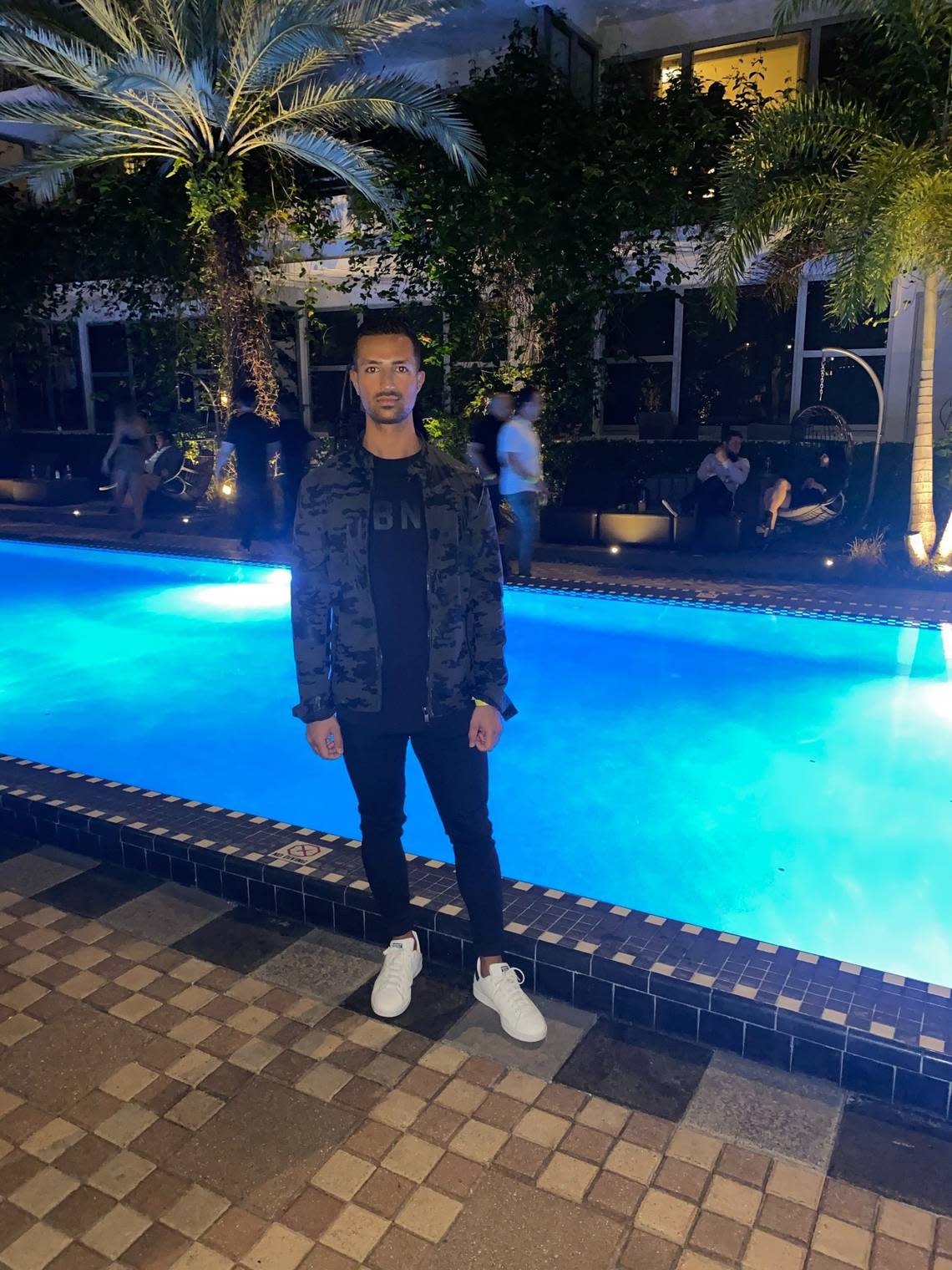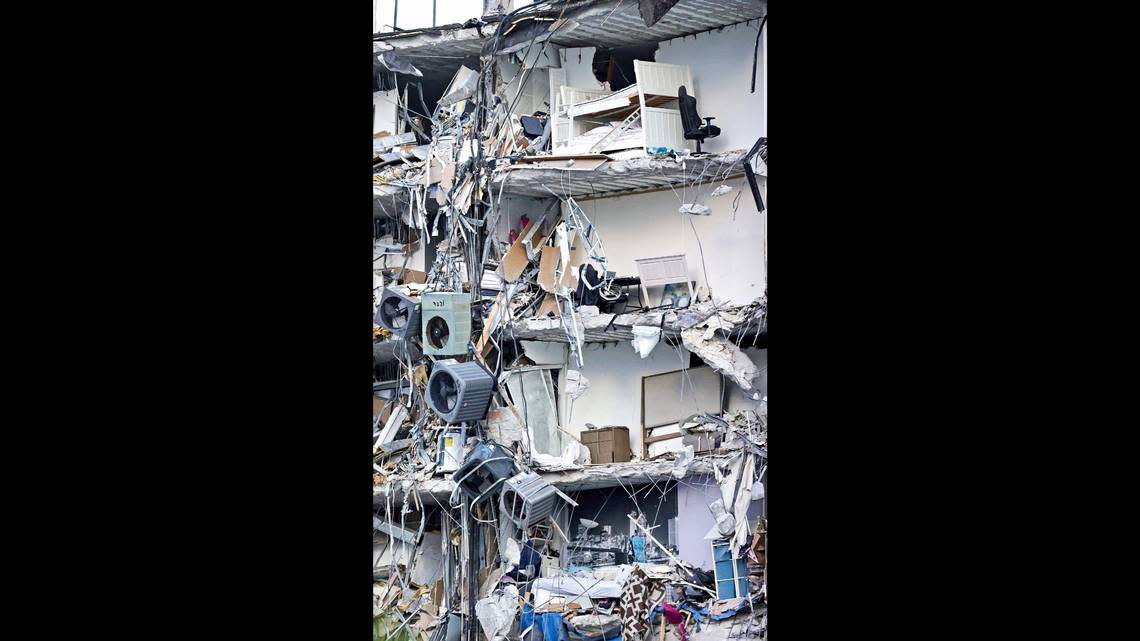Two years after Surfside condo collapse: ‘We haven’t recovered. Don’t forget about us’
In the two years since his family’s condominium was destroyed in the collapse of Champlain Towers South, Gabe Nir has moved 10 times.
He has been unable to find a new home, and, worse, he cannot find peace.
Nir, 27, was one of only four people living in the Surfside condo who escaped before their section of the building fell. Three others were rescued from the rubble. When the 12-story tower came down at 1:22 a.m. on June 24, 2021, likely as a result of 40-year-old design and construction flaws, 98 people ranging in age from 2 to 92 died.
Read More: How decades of problems converged the night Champlain Towers fell
Nir, his mother and his sister ran for their lives. The terror revisits each of them at unpredictable moments and most often at night.
“I feel like my body and my brain are still in a state of shock and I’ve never really processed what happened,” he said. “I feel numb. I’ve been hospitalized five times with vertigo. Some days I can’t even go out because I’m too dizzy.”
That feeling of imbalance and disorientation has been exacerbated by all the moving. The Nirs have lived like nomads in hotels, apartments and now a rented house in Aventura, sometimes pushed out of their temporary quarters by rental rates that are the highest in the country. They’re still living out of suitcases, filled with the clothes they’ve acquired since they lost everything.
They’ve lost any sense of home, what it means to be home. When one of them says, “I’ll see you at home,” it sounds strange, false.
“Well-meaning people tell us we should be thankful we’re alive and assume after two years we’ve recovered,” Nir said. “It’s the opposite of that. It infuriates me when people say we’re a miracle family. Survival comes with a high price.”
Depression, anxiety, insomnia, guilt, post-traumatic stress disorder, headaches, flashbacks — especially when he enters buildings or elevators: The Champlain South survivors will never be the same.
The Nir family has been homeless before. Five years ago their house in Atlanta caught fire and burned to the ground. They barely got out. Nir remembers waking up in the middle of the night, coughing and blinded by smoke.
“When Champlain went down, I asked my mom, ‘Is this Round 2?’” Nir said. “I’m afraid of darkness. I’m afraid to sleep. I stay up at night to make sure we’re safe.”
On the night of the collapse, Nir, his mother Sara and his sister Chana were awake inside unit 111, right next to the pool deck. Gabe was cooking salmon, Chana was in the shower after a babysitting job and Sara was typing on her cell phone. They heard banging noises from above and a boom-boom-boom sequence, “like someone was moving furniture or hammering picture hangers into the walls,” Nir said. “There was rumbling under the floor.”
Sara went to the lobby to complain to security guard Shamoka Furman. While they were talking, the pool deck collapsed into the parking garage below, setting in motion the progressive structural failure that would break the columns supporting the building. Seven minutes later, two sections of the tower fell. A federal investigation of the causes of the disaster is ongoing and projected to be completed in 2025.

But during that seven-minute gap, Sara managed to dash back down the hall to her kids, shouting, “Earthquake! We’ve got to get out! Hurry!”
They ran through the lobby, telling Furman to call 911 and set off the alarm system. Furman, who was new on the job, asked them the address, which was 8777 Collins Ave.
The Nirs went out the glass front doors and ran down the street as a huge ball of white dust and smoke chased them. Nir called 911 twice on his cell phone. He looked back and saw people streaming out of the section of the building that stayed intact. He saw a woman pushing a stroller and screaming. Nir ran in Crocs and his sister wore a bathrobe with a towel wrapped around her head. Sara knocked on doors, yelling “Earthquake! Evacuate!”
When the rescue teams arrived and the streets were blocked, the Nirs were told to go to the Surfside Community Center, which is where they spent the next three days.
Then two years adrift.
In May 2021, Nir graduated from Georgia State with a chemistry degree and planned to apply to dental school. His career has been put on hold. He tutors students but has been unable to hold down a full-time job because he was calling in sick too often. Nir’s father Eyal (who was in Atlanta at the time of the collapse) is a jeweler. His mother is a teacher at a Jewish school. Chana, 17, will be a high school senior.
“It’s hard to explain. I feel stuck,” Nir said. “I’m not ready to go back to school. I need to work on myself. It’s a hard climb up from rock bottom.”
Nir’s family and other survivors believe their ordeal was made much more difficult by what they consider an unfair distribution of money from the $1.1 billion settlement of the class-action case against various defendants – the Champlain South condo board, engineering firms, companies involved in the construction of a luxury condo next door, the security company that maintained Champlain South’s alarm system, which acknowledged that Furman was not adequately trained.
The Nirs were renting their unit so were not entitled to the compensation owners received. The relatives of those who died received the bulk of damage awards decided by Judge Michael Hanzman, who retired in April.
Nir received the minimum award, $50,000. His mother received $100,000 and Chana $100,000. Owners were unhappy with awards that were far less than the market value of their condos, leaving them unable to buy anything comparable in Miami Beach or Miami. The highest wrongful death award of about $35 million — based on projected lifetime earnings — went to the family of a victim aged in their mid-20s.
Hanzman had warned throughout the process that it would be impossible to decide on a value for each individual that would please everyone but that the awards were fair, similar to what a jury would have awarded, and in accordance with the law. Nir was upset by how lawyers and the judge congratulated themselves on a huge settlement that left many survivors and family members of victims embittered. Survivors who are struggling emotionally and financially felt they deserved a bigger piece of the pie once the billion-dollar settlement -- much higher than initially expected -- was reached with the defendants’ insurance companies. Not in the range of the families of those who died, but closer to covering their losses and the trauma treatment they will require for years, if not a lifetime.
“The judge was called a hero but he did a horrible job. The lawyers didn’t fight for us and wound up getting paid more than us,” Nir said. “All of us from the building were very close and supportive after the collapse but since the settlement we don’t talk, there’s a lot of resentment and anger. The judge did not treat people equally. I want to tell the judge, ‘Look what you did to us, you made us hate each other.’”
Two years on, Nir is still trying to heal.
“We haven’t recovered,” he said. “Don’t forget about us.”

